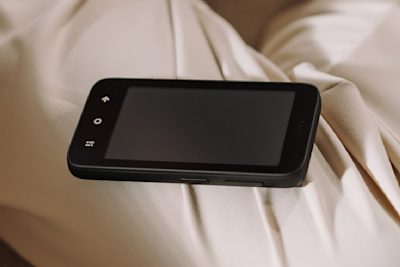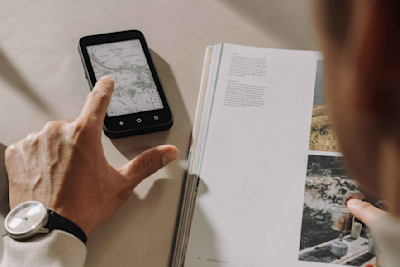
How to Combat Popcorn Brain & Boost Focus with Mindful Tech Use
Are you more scatterbrained than before?
Without a doubt, we live in a hyper-connected world and many of us find it challenging to concentrate on a single task without feeling the urge to check our phones or switch between apps. The problem is that this constant distraction can lead to what’s known as “popcorn brain,” where our minds are constantly jumping from one thing to another. This can make it difficult to focus on anything for long periods of time and can even lead to feelings of anxiety and stress.
More Focus with Mudita Kompakt
This phenomenon is becoming increasingly common, fueled by our constant engagement with digital devices and social media. When I first heard of the term, I thought it’s because we gobble up gigabytes of data like it's popcorn, streaming endless short videos and scrolling through posts until our brain is numb. Or maybe it’s because we’re so hooked on electronic multitasking that attention span is now measured in microwave minutes.
However, what exactly is Popcorn Brain, and how does it affect our focus and productivity? More importantly, how can we combat it through mindful tech use and digital minimalism? Time to explore these buzzing questions. (pun intended)
Let’s get into it.
What Is Popcorn Brain?
Popcorn Brain is a term used to describe the cognitive effects of excessive multitasking and constant digital stimulation. Coined by quality-of-life UW iSchool researcher David Levy in 2011, it refers to the state of being so accustomed to rapid-fire, fragmented information that slower-paced, offline activities feel boring and unstimulating.
This mental state is characterized by a diminished attention span, impulsivity, and difficulty sustaining focus on a single task. To put it simply, spending too much time looking at screens & jumping back and forth between your phone, computer, and TV can make it tough to just focus on one thing at a time.
The Impact of Popcorn Brain on Focus and Productivity
Popcorn Brain can significantly impair our ability to concentrate and be productive. Think about this fun fact: research shows that it takes an average of 23 minutes to regain focus after a distraction because different parts of your brain are activated every time you switch between tasks.
Here are some of the key ways it affects us:
Frequent Distractions: The constant barrage of notifications and alerts makes it hard to maintain focus on any single task. Each ping or vibration pulls our attention away, leading to frequent interruptions and fragmented thinking.
Reduced Attention Span: Social media platforms and apps are designed to deliver information in short, stimulating bursts. This trains our brains to crave quick gratification, making it challenging to engage in deeper, sustained focus.
Overwhelm and Stress: The endless stream of information can create a sense of overload, leaving us feeling stressed and overwhelmed. This mental clutter can make even simple tasks seem unmanageable.
Decreased Productivity: Multitasking might seem efficient, but it often leads to lower overall productivity. Constantly switching between tasks prevents us from fully engaging with any one activity, resulting in poorer performance and increased errors. Those interruptions can really derail your productivity- 23 minutes at a time.
Get Mudita Kompakt on Indiegogo
Combating Popcorn Brain Through Mindful Tech Use and Digital Minimalism
The good news is that the effects of Popcorn Brain are reversible. By adopting mindful tech use and embracing digital minimalism, we can retrain our brains to focus better and improve our productivity.
Here’s how:
Set Time Limits for Digital Use: Allocate specific time periods for checking social media and emails. Limit screen time and block certain apps after a designated period.
Practice Mindfulness: Incorporate mindfulness techniques such as meditation and deep breathing exercises into your daily routine. These practices can help clear mental clutter and enhance your ability to focus.
Create Tech-Free Zones: Designate certain areas in your home or office as tech-free zones. This could be a cozy reading nook or a part of your dining area where you can disconnect from screens and engage in offline activities. Your bedroom should also be a tech-free zone. If you use your phone as an alarm clock, replace it with a more mindful offline device, like Mudita Harmony or Mudita Bell.
Prioritize Tasks: Use tools like to-do lists or task management software to prioritize your tasks. Focus on completing high-priority items first and avoid the temptation to multitask.
Take Regular Breaks: Schedule regular breaks throughout your workday to rest and recharge. Short breaks can help prevent burnout and maintain your mental clarity.
Engage in Physical Activities: Incorporate physical activities like walking, yoga, or any form of exercise into your daily routine. Physical movement not only boosts your physical health but also helps refresh your mind.
Check out the new FOCUS TIMER feature on Mudita Harmony
The FOCUS TIMER on Mudita Harmony, inspired by the Pomodoro technique, lets you break-up work into digestible slots, like 25 or 30 minutes, followed by short breaks. This helps you avoid distractions and stay focused on your tasks.
Mudita Advocates of Mindful Tech Use and Digital Minimalism
At Mudita, we believe in fostering a healthy relationship with technology through mindful tech use and digital minimalism. Our products are designed to help you stay connected without compromising your mental well-being. For example, our new phone, Mudita Kompakt, offers essential connectivity features while minimizing distractions, encouraging you to engage more fully with the world around you. Our mindful alarm clocks, Mudita Bell & Mudita Harmony are designed to help you wake up gently and naturally, so you can start each day feeling refreshed and ready for whatever comes your way.
Mudita Harmony 2 and Mudita Bell 2
By choosing Mudita, you are embracing a lifestyle that prioritizes mental clarity, focus, and overall well-being. Our mission is to empower you to take control of your digital habits, reduce the impact of Popcorn Brain, and lead a more balanced, productive life.
MuditaOS K features a minimalist interface and puts privacy first.
Final Thoughts
Yes, Popcorn Brain is a modern challenge, but with mindful tech use and digital minimalism, we can reclaim our focus and productivity. By setting boundaries with our devices, practicing mindfulness, and embracing a minimalist approach to technology, we can enjoy the benefits of connectivity without falling prey to its distractions.
Mudita stands with you on this journey, offering tools and support to help you achieve a healthier, more intentional relationship with technology.
Related stories

Why an E Ink Phone Is the Smartest Choice for a Digital Detox
E Ink phones like Mudita Kompakt offer a smart middle ground for digital detox with essential features without the distractions of modern smartphones.

Mindful tech use & the key to a healthier, happier brain
Overstimulation from screens is reshaping your brain, it harder to focus & stress more. Learn practical ways to reset, regain clarity & use tech more mindfully.

Last Chance to Get Mudita Kompakt at Pre-Order Pricing
Last chance to get the Global Optimized version of Mudita Kompakt at pre-order pricing! Secure yours by May 7th, 2025 before the price increases.
If you'd like to receive the best stories from our blog, keep up to date with our progress and get notified about our product releases and special discounts.